#ralph herforth
Explore tagged Tumblr posts
Text








Short Sharp Shock (Kurz und schmerzlos) (1998) Fatih Akin
November 24th 2024
#short sharp shock#Kurz und schmerzlos#1998#fatih akin#Mehmet Kurtulus#Mehmet Kurtuluş#Aleksandar Jovanovic#Aleksandar Jovanović#Adam Bousdoukos#Regula Grauwiller#İdil Üner#Ralph Herforth
3 notes
·
View notes
Text
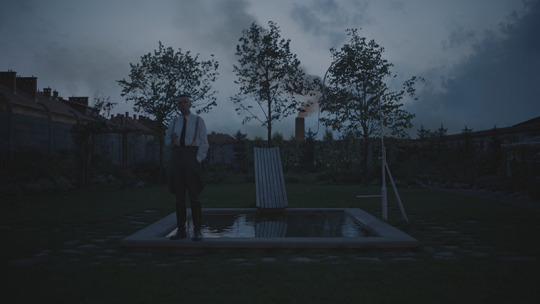

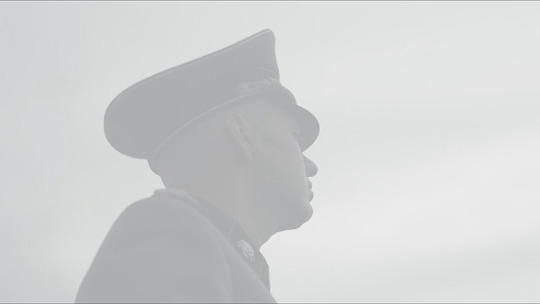

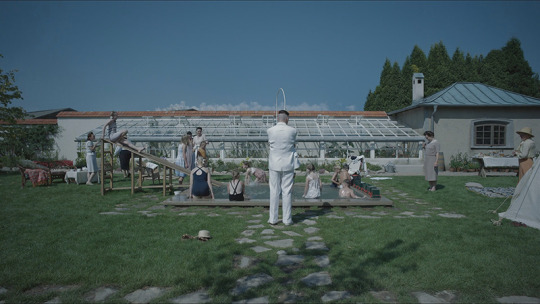

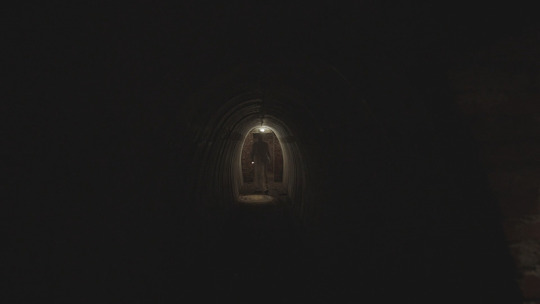
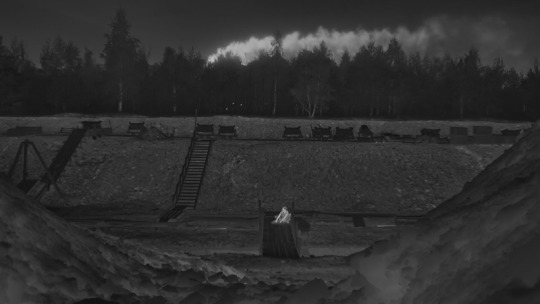
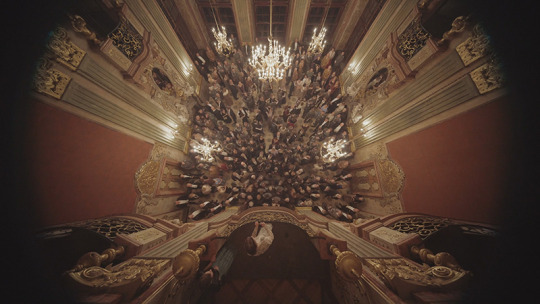
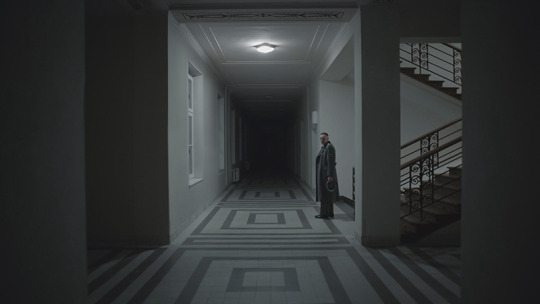
THE ZONE OF INTEREST (Jonathan Glazer, 2023)
Cuando vi esta película por primera vez en el Festival Internacional de Cine de Gijón, inmediatamente se me vinieron a la cabeza obras como 2001: A Space Odyssey o There Will Be Blood. ¿Qué motivos impulsaron a Jonathan Glazer a tomar decisiones formales tan arriesgadas? ¿Por qué ese arranque? ¿Por qué esa obertura? Quizá, de una forma paradójica y alegórica, se pretende enfatizar la idea de que las imágenes que otorgan entidad a la película intentan rebelarse contra sí mismas para no ser mostradas. Resulta entonces imposible ignorar la figura de Claude Lanzmann y su memorable digresión en torno a la ética, la moral y la exposición de la infamia.
Dado que la película se filma desde el punto de vista de lo inconcebible, adopta un carácter observacional, flemático y ascético que, en ocasiones, podría disociarnos de la atrocidad y acercarnos a un escenario costumbrista y rutinario. Ahora bien, si el medio es el mensaje —tal y como afirmaba Marshall McLuhan— o, si se prefiere, la forma crea el contenido —deducción archiconocida de Chabrol en referencia al cine de Hitchcock—, entonces lo verdaderamente revelante y relevante para entender esta película se localizaría en el formato utilizado, así como en su óptica y sonoridad. Elementos que aluden de forma constante al contraplano que jamás se muestra y que, por ello, trasciende aún con mayor contundencia y hondura. Al otro lado de esos muros de contención quizá podríamos descubrir al miembro de los Sonderkommandos Saul Ausländer de la película de László Nemes pero, en The Zone of Interest, la materialización fílmica de esa evocación se nos muestra en formato termográfico, habitando un terreno aparentemente ilusorio cuya transmutación en realidad se consuma cuando la narración retorna a los quehaceres domésticos y mundanales que viabilizan la preservación del punto de vista heterodiegético.
Aquellos que hayan leído la novela en que se basa se habrán percatado de que Jonathan Glazer tan solo la utiliza como punto de partida, si bien es cierto que para con algunas de sus escenas funciona perfectamente como subtexto de acompañamiento. Martin Amis ficciona una trama y la sitúa en un momento histórico determinado. La película, sin embargo, se aleja de este enfoque, lo que permite que incida con mayor profundidad en su condición empírica y cáustica.
Los momentos en que la pantalla se satura por completo de colores elementales, incorporan fugaces instantes de reflexión ante unas imágenes que supeditan sus formas de arte y representación a la realidad misma que las fundamenta. Esta explicitación articula la parte emocional. La inverosímil y admirable composición musical de Mica Levi converge con el material filmado para convulsionar el relato y el ideario subyacente. Es aquí donde volvemos a la intersección de una disonancia inarmónica que se superpone a ciertos sonidos y situaciones sumidas en la más absoluta cotidianidad. Por otro lado, la ceremonia litúrgica que abre y cierra la película entre tinieblas, el blanco cegador despojado de su pureza o el rojo sangre como encarnación de lo abominable, serían ejemplos paradigmáticos de este aparataje sensitivo.
En su parte final, Rudolf Höss nos devuelve la mirada y desdibuja la línea temporal que se había mantenido hasta ese momento. Jonathan Glazer se transforma entonces en un pseudodocumentalista para mostrarnos imágenes recientes del Museo de Auschwitz y la película nos recuerda que ninguna situación pasada, presente ni futura debería permitirnos tomar distancia ante determinados sucesos que fueron, son y serán.
En el año 2019 Jonathan Glazer filmó un cortometraje basándose en la obra El sueño de la razón produce monstruos de Goya y, en él, anticipa buena parte de este planteamiento. Los personajes de esta pieza de cámara ocultan sus rostros y cuerpos bajo disfraces, de lo cual se puede inferir que cualquiera de nosotros podría ser uno de ellos. Llegados a este punto, quizá no resulte tan sencillo obviar la ignominia que nos rodea.
Se trata de una mera coincidencia, pero tras asistir a la proyección de la película estuve leyendo la novela Stella Maris de Cormac McCarthy. De su pluma y de la mente esquizofrénica del personaje de Alicia Western surgió de repente un pasaje que rápidamente identifiqué como una derivación de lo que había visto en pantalla. Es este:
"Coges una serie de imágenes fijas y las pasas en tándem a una determinada velocidad ¿y qué es eso que parece la vida misma? Nada más que una ilusión. ¡Anda! ¿Y qué es eso? Bah, qué importa si así haces que vuelvan los muertos. Lógicamente ellos no tienen gran cosa que decir. ¿Qué quieres? Llame antes de excavar. Habrá quien piense que el truco está en encontrar la pista de alguna realidad colateral. Por si no pillas la falacia implícita. La pertinente malicia. Puedes aportar vectores nuevos, aunque eso no es señal de que vayan a funcionar. ¿Te parece una buena idea? ¿Y si la gente quiere volver? La gente no puede volver. Así me gusta. La gracia está en que nunca vas a tener una pantalla en blanco. Y por supuesto lo que cuenta no es lo que se ve sino quién lo puso allí. Si en un momento dado miras y no hay nada en la pantalla ya lo pondrás tú misma, por qué no"
#the zone of interest#la zona de interes#jonathan glazer#christian friedel#sandra huller#ralph herforth#max beck#marie rosa tietjen#sascha maaz#stephanie petrowitz#lilli falk#freya kreutzkam#ralf zillmann#imogen kogge#nele ahrensmeier#johann karthaus#daniel holzberg#medusa knopf#luis noah witte#christopher manavi#zuzanna kobiela#julia polaczek#wolfgang lampl#film#cine
6 notes
·
View notes
Text
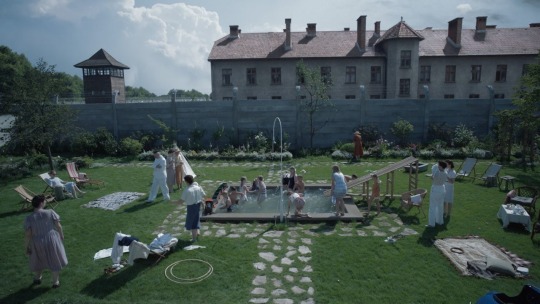
The Zone of Interest (2023, United Kingdom/Poland)
Over the last decade, English director Jonathan Glazer questioned whether it was appropriate for him to make a Holocaust movie from a Nazi perspective. Glazer, who comes from a Jewish family in north London, said that his family never spoke about the Holocaust at home, but it nevertheless loomed over their lives. His late father, when learning about Glazer’s decision to adapt Martin Amis’ novel The Zone of Interest, expressed disapproval. Yet Glazer forged ahead, his vision now complete.
I am no expert in the area of Holocaust cinema (of which there is a growing and always-controversial history) and do not profess to be a specialist of the Holocaust or Nazism. Nevertheless, I do believe it is possible to make a moral Holocaust narrative film from a Nazi point of view. Does Glazer succeed in doing so? That is a question that still perplexes me, and I am not sure if I can provide any satisfying answer. Given Glazer’s moral agonizing while making and within the visuals of this film, I am not sure if he knows either. So while I will still attempt to engage with the morality of The Zone of Interest (which, by many accounts, resembles little of Amis’ novel), this write-up’s premise will concentrate on two of the film’s goals as stated by Glazer himself.
The first is to immerse the viewer into the psychologies of Auschwitz concentration camp commandant Rudolf Höss (Christian Friedel; Rudolf Höss was the longest-serving commandant of the camp) and his wife, Hedwig (Sandra Hüller), and understand how their mindset is similar to how the viewer compartmentalizes modern-day atrocities. In these respects, Glazer succeeds. Just. Secondly, Glazer, “wanted to remove the artifice of filmmaking” in order to make as natural a film as he could, so that the audience can pay stricter attention to what is occurring on-screen. This is where The Zone of Interest falters.
It is 1943 in Nazi-occupied Poland. The Höss family lives in an estate just outside the walls of Auschwitz. Some days, the five children and their parents spend a lazy outing at a nearby riverbend, swimming and enjoying nature. At home, the Höss parents shield their children from the ugliness of the Second World War and the mass human suffering occurring just beyond the walls of the camp next door. Hedwig’s perfectly manicured garden, replete with flowers for decoration and herbs for cooking, is her escape – a world without wants. A small pool in the spacious backyard provides the children plenty of swim time. On a clear day, we can see the smoke stacks of an approaching train in the distance, soon to drop off its passengers to a place worse than hell itself. At night, Auschwitz’s crematorium spews an unearthly red – piercing the sky and sneaking past the drawn curtains of the Höss estate. And at all hours, we hear gunfire and screaming emanating from inside the camp.
Never do cinematographer Łukasz Żal’s (2014’s Ida, 2018’s Cold War) cameras show any glimpses of life within Auschwitz’s walls. None of the human suffering wrought by the Nazis appears directly in the film. We have a fleeting glimpse, obscured by foliage and for purposes unclear, of chained prisoners walking outside the camp’s walls under military escort. In another moment in the Höss household, a female prisoner comes to Rudolf Höss’ office for what is presumed to be forced sex; we never see or hear from her again, as we witness him wash his genitals (filmed from his backside) after their encounter. The particulars of what the Nazis did to the inmates of Auschwitz and the other concentration camps is for another film, Glazer says, a self-admission that he cannot hope to capture that suffering in narrative or documentary form. The decision not to show any Holocaust cinema has precedent, as seen in Claude Lanzmann’s documentary Shoah (1985, France) – largely seen as the 566-minute magnum opus of Holocaust cinema.
Instead, Glazer is more interested in something that has become a cliché in all writings on The Zone of Interest – what philosopher Hannah Arendt deemed the “banality of evil” – in order to allow modern audiences understand their own complicity in contemporary atrocities. Writing on the 1960 trial of Adolf Eichmann (one of the crucial facilitators of the Holocaust) in Israel, Arendt’s definition of the “banality of evil” stemmed from her subject’s lack of ideological fanaticism towards Jews, coupled with his inclination towards professional progression if it meant not having to think critically about any moral issues tied to said progression.
Arendt’s definition of the “banality of evil” has been controversial ever since the publication of 1963’s Eichmann in Jerusalem – a common accusation that Arendt was trying to diminish the severity of Eichmann’s guilt (she was not). Controversies aside, The Zone of Interest, on a cinematic surface, adopts that same “banality of evil”. The Höss parents never engage in explicit anti-Semitic language or refer to Auschwitz’s inmates as subhuman. Though Rudolf washes his genitals after the presumed sexual encounter with the prisoner and Hedwig seems uneasy when going through the luxury clothes of incarcerated/deceased camp inmates, life otherwise appears normal. In a scene where Rudolf is meeting with a private contractor on a more efficient crematorium system, both Rudolf and the contractor speak not with genocidal terms, nor carefully-worded innuendos. Instead, their meeting covers only the mechanics of the proposed system, in numbers and cold engineering efficiency. Without the historical context of The Zone of Interest, that discussion might eerily fit in a plain industrial meeting (not so much a later meeting with other concentration camp commandants as they discuss an imminent influx of Hungarian Jews to their camps).
To what lengths can a person accept the rationalizations of a leadership bent on the mass slaughter of innocent people on an industrial scale? Similarly, how does one reckon with their ostensibly peaceful existence when that peace is made possible only by revolting violence just a stone’s throw away? For these questions, we never receive any answers from anybody in the Höss family or their associates depicted within this film or from history itself. They live life without examining themselves, with no hints of regrets.
With the Höss parents not providing potential answers, it then turns to the viewer to ask themselves those same questions. I do not wish to come off as a youth-basher, but younger (American) viewers will need additional context for this film, if generational rates of Holocaust denialism are to be believed. For the rest of us, can we imagine ourselves turning a blind eye or going about our daily lives knowing that our happiness rests on the oppression, subjugation, or mass murder of a people? What do you share, personally, with Rudolf and Hedwig Höss? Does The Zone of Interest, in reaction to popular Hollywood Holocaust dramas of the 1990s and 2000s (see: 1993’s Schindler’s List, 2002’s The Pianist), paint the Holocaust as a non-unique event? This is a provocative work from a filmmaker who, in the absence of a grander narrative or intentional moralizing in his work, turns all of the introspection onto the audience. Beyond that, the film in and of itself is ideologically hollow.
The other half of Jonathan Glazer’s aims for The Zone of Interest was to create a film with minimal cinematic artifice. Łukasz Żal’s unobtrusive compositions and mostly-still camera certainly help in this regard, but too often some of the interior shots of the Höss household appear as if they are coming from the corners of the room, like anachronistic security camera footage. Most anachronistic of all are the black-and-white scenes in night vision for exterior shots of a young girl leaving apples around workplaces at Auschwitz. How jarring that the most humanistic moments of The Zone of Interest appear in the most visually artificial scenes of the film. The use of a night vision camera broke whatever hold The Zone of Interest had on me, cinematically. It comes off as a needless artistic flourish, as if to impress a captive audience.
Worst of all is Mica Levi’s horrific and unlistenable score. The score, for the ten to fifteen minutes it plays (hardly a score given a 106-minute runtime), is an atonal howler that shares a close relationship with the sound mix* – to the point where numerous other film critics have conflated the two. If Glazer is attempting to dissociate his film from the artifices of cinema, I cannot think of a better encapsulation of how quickly he fails than with this collaboration with Levi. In a time when many directors are telling their composers that they do not want noticeable music (in most instances, a fundamental misunderstanding about the dramatic and emotional capabilities of film music), Levi’s score is inescapable. Its heavy sonic distortions; complete dismissal of any familiar intonation (one of Levi’s primary influences is experimental composer Harry Partch, whose music obliterates the familiar seven pitches of a diatonic scale in favor of a 43-tone scale with uneven intervals); and bizarre use of electronically-manipulated choral screaming (a kitschy musical decision that borders on the insensitive and tasteless) might perfectly set the tone for some viewers. For myself – especially the scenes shot in night vision and the moment the screen fades to red – it was a discordant distraction that, again, only served to take me out of the movie.
The best film scores have several disparate but heavily interdependent and coequal qualities: they empower, but not overtake, the comedic/dramatic and emotional power of a movie and its narrative (if a narrative is present); they should typify exemplary musicianship (in composition and performance); and the viewer should be able to hear the music. Levi and Glazer share the failure on the the first two aspects. It is only on this third aspect that Mica Levi’s work truly contributes to The Zone of Interest – a film that would be better treated without a score.
The Zone of Interest raises pertinent questions of culpability and human responsibility in reckoning with humanity at its worst. There are moments in here – mostly scenes in which the reality of the Holocaust leaves its terrible shadow over the Höss family, moments where you expect them to possibly recoil from what they are doing – that stick with me, and haunt my ruminations over how I rationalize living in a society built on violence. Crucially, The Zone of Interest is not unique in inspiring such thoughts in a person, as some are suggesting. Martin Scorsese’s Killers of the Flower Moon (2023) and Steve McQueen’s 12 Years a Slave (2013) also provoked a similar introspection in me – these films depict two episodes within the context of the two original sins of my home nation. And though neither of those films centralize the goodness of others (far from it), if one looks close enough, one can find the banality of good (amid more naturalistic filmmaking).
In the end, Jonathan Glazer’s treatment of The Zone of Interest buckles underneath the weight of his promise to forego the conventions of art cinema. His objectives conflict with the artistic trappings – in its cinematography, music, sound mix, and an intellectual remove from human nature that I am unsure is appropriate for this subject matter – found within. It leaves his promise utterly broken.
My rating: 5/10
^ Based on my personal imdb rating. My interpretation of that ratings system can be found in the “Ratings system” page on my blog. Half-points are always rounded down.
* You hear nearly everything in this film. Sometimes, a little too perfectly. There are several moments in The Zone of Interest in which you hear the screams of Auschwitz’s prisoners or gunshots and they sound as if they are far too close to the Höss household than they should be. It reminded me, to paraphrase Larry Mantle on the December 15, 2023 episode of FilmWeek, of stage plays using off-stage tapes to play sounds for activities ostensibly not occurring "on stage". While that might work in a stage play, that is not the sort of comparison I wish to be making when writing on a film.
For more of my reviews tagged “My Movie Odyssey”, check out the tag of the same name on my blog.
#The Zone of Interest#Jonathan Glazer#Christian Friedel#Sandra Hüller#Ralph Herforth#Daniel Holzberg#Sascha Maaz#Martin Amis#Łukasz Żal#Paul Watts#Mica Levi#Tarn Willers#Johnnie Burn#A24#31 Days of Oscar#My Movie Odyssey
2 notes
·
View notes
Text
Knockin' on Heaven's Door

Knockin' on Heaven's Door [trailer]
Two terminally ill patients escape from a hospital, steal a car and rush towards the sea.
One of those older movies whose assessment is influenced by nostalgia. It's unlikely that someone who's watching the film for the first time now will like it. It's a product of its times.
The story itself is simple and familiar. But there are countless small roles that are amusing and performed by popular actors like Hannes Jaenicke, Corinna Harfouch, Christiane Paul, and also directors like Hark Bohm and Sönke Wortmann. There's also a strong Dutch/Luxembourg connection consisting of Thierry van Werveke, Huub Stapel and Rutger Hauer.
It's also one of the few movies with Til Schweiger that I don't want to switch off immediately.
Side note, listening to the audio commentary with director Thomas Jahn risks losing your wish to ever wanting to see the film again.
#Knockin' on Heaven's Door#Thomas Jahn#Til Schweiger#Jan Josef Liefers#Thierry van Werveke#Moritz Bleibtreu#Huub Stapel#Leonard Lansink#Ralph Herforth#Hannes Jaenicke#Christiane Paul#Willi Thomczyk#Corinna Harfouch#Jürgen Becker#foreign#Germany#like
0 notes
Text

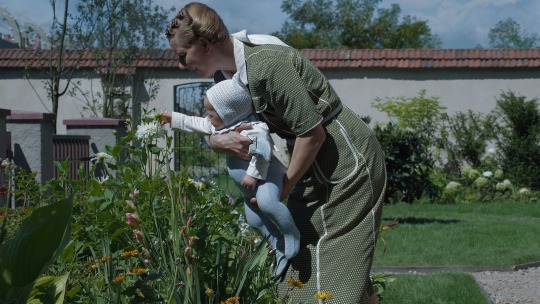

The Zone of Interest
2023. Historical Drama
By Jonathan Glazer
Starring: Christian Friedel, Sandra Hüller, Ralph Herforth, Daniel Holzberg, Sascha Maaz, Freya Kreutzkam, Imogen Kogge, Johann Karthaus, Lilli Falk, Nele Ahrensmeier, Luis Noah Witte, Kalman Wilson, Anastazja Drobniak, Cecylia Pekala...
Country: United States, United Kingdom, Poland
Language: German, Polish, Yiddish
#The Zone of Interest#Jonathan Glazer#Christian Friedel#Sandra Hüller#Ralph Herforth#Daniel Holzberg#Sascha Maaz#Freya Kreutzkam#Imogen Kogge#Johann Karthaus#Lilli Falk#Nele Ahrensmeier#Luis Noah Witte#Kalman Wilson#Anastazja Drobniak#Cecylia Pekala#United States#United Kingdom#Poland#German#Polish#Yiddish#2023#2020s#Drama#History
0 notes
Text

THE ZONE OF INTEREST 2023
The heartfelt time we spent in the Höss house will always be among our most beautiful holiday memories. In the East lies tomorrow. Thanks for your National Socialist hospitality.
#the zone of interest#2023#christian friedel#sandra hüller#ralph herforth#daniel holzberg#sascha maaz#freya kreutzkam#imogen kogge#johann karthaus#lilli falk#nele ahrensmeier#luis noah witte
0 notes
Text
The Zone of Interest (2023)
The Zone of Interest (2023) #JonathanGlazer #SandraHueller #ChristianFriedel #RalphHerforth #FreyaKreutzkam #MaxBeck Mehr auf:
Jahr: 2023 (Dezember) Genre: Drama / History / Kriegsfilm Regie: Jonathan Glazer Hauptrollen: Sandra Hüller, Christian Friedel, Ralph Herforth, Freya Kreutzkam, Max Beck, Imogen Kogge, Stephanie Petrowitz, Ralf Zillmann, Marie Rosa Tietjen, Lilli Falk, Christopher Manavi, Sascha Maaz, Anastazja Drobniak, Medusa Knopf, Johann Karthaus, Luis Noah Witte … Filmbeschreibung: Hedwig Höß (Sandra…

View On WordPress
0 notes
Text
THE ZONE OF INTEREST:
Nazi family
Living next door to Auschwitz
Living complicit
youtube
#the zone of interest#random richards#poem#haiku#poetry#haiku poem#poets on tumblr#haiku poetry#haiku form#poetic#sandra huller#christian friedel#freya kreutzkam#Ralph Herforth#jonathan glazer#martin amis#academy award nominee#best picture#best international feature#best sound#best director#best adapted screenplay#Youtube
0 notes
Text
The Zone of Interest (2023) Review
We follow the life of Rudolf Höss the commandant of Auschwitz and his wife Hedwig living in a house next to the wall of the camp, bringing up their five children and living what looks like a happy life. ⭐️⭐️⭐️⭐️ Continue reading Untitled

View On WordPress
#2023#Christian Friedel#Christopher Manavi#Cinema#Drama#Freya Kreutzkam#History#Imogen Kogge#Johann Karthaus#Jonathan Glazer#Julia Polaczek#Lilli Falk#Marie Rosa Tietjen#Martin Amis#Max Beck#Nele Ahrensmeier#Preview#Ralf Zillmann#Ralph Herforth#Review#Sandra Hüller#Stephanie Petrowitz#The Zone of Interest#Unlimited Screening#War#Zuzanna Kobiela
0 notes
Text
youtube
The Zone of Interest Trailer
A24 has released a trailer for Jonathan Glazer's The Zone of Interest. The film stars Sandra Hüller, Christian Friedel, and Ralph Herforth.
The Zone of Interest follows Rudolf Höss and his wife Hedwig, striving to build a dream life for their family in their home and garden. Höss is the commandant of Auschwitz and their home is next to the concentration camp.
Zone of Interest is inspired by the novel by Martin Amis. Writer/director Glazer also collaborated with the Auschwitz Museum and other organizations to access archives and examine testimonies from the survivors and individuals employed in Höss' household. The film uses the real names of these people.
#zone of interest#jonathan glazer#sandra huller#christian friedel#ralph herforth#martin amis#a24#film4 productions#access enertainment#TGCLiz#Youtube
1 note
·
View note
Text
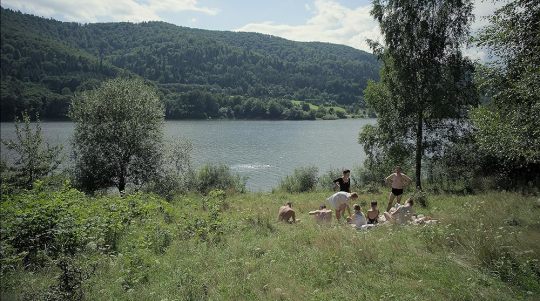
The Zone of Interest, Jonathan Glazer (2023)
#Jonathan Glazer#Sandra Hüller#Christian Friedel#Freya Kreutzkam#Ralph Herforth#Max Beck#Ralf Zillmann#Lilli Falk#Wolfgang Lampl#Lukasz Zal#Mica Levi#Paul Watts#2023
1 note
·
View note
Photo
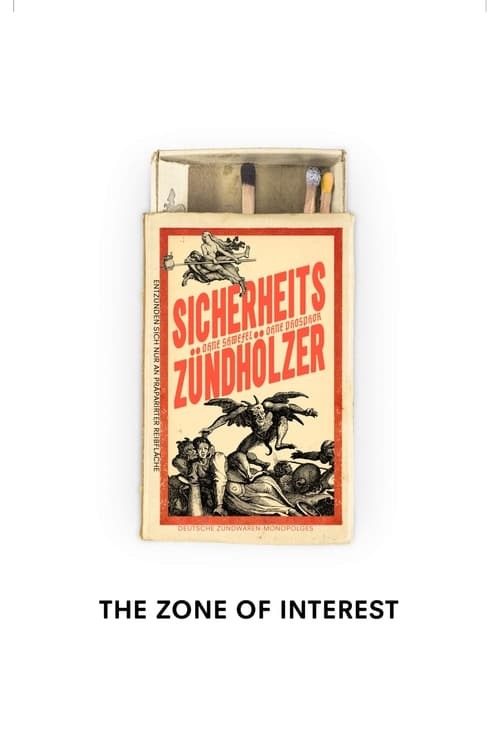
The Zone of interest

Un film de Jonathan Glazer Avec: Sandra Hüller, Christian Friedel, Ralph Herforth, Maximilian BeckSeconde Guerre mondiale. L’histoire d’amour compliquée entre un officier nazi et la femme d’un kapo. Ce dernier tente de contourner l’horreur génocidaire mais il commence à avoir des soupçons envers son épouse.
Retrouvez l'article complet ici https://is.gd/2wlBIk
2 notes
·
View notes
Text

Sarah Bauerett, Carlo Ljubek, Ralph Herforth & Felix Hellmann
The Actors and TV/Movie Stars on Set in Berlin.
0 notes
Text
CINE EXPRESS: “The Zone of Interes”
Helena Garrote Carmena Año: 2023País:Reino UnidoDirección:Jonathan GlazerGuion:Jonathan GlazerActores: Sandra Hüller, Christian Friedel, Ralph Herforth, Max Beck, Marie Rosa Tietjen, Sascha Maaz, Stépanie Petrowitz, Lili Falk, Freya Kreutzkam.Género: Drama – Holocausto.Basada en la novela de Nartin Amis. Estamos habituados a ver todo tipo de criminales y todos nos hemos preguntado alguna vez:…

View On WordPress
0 notes
Text
1 note
·
View note
Photo


CALIFICACIÓN PERSONAL: 5 / 10
Título Original: Freaks – Du bist eine von uns
Año: 2020
Duración: 92 min
País: Alemania
Dirección: Felix Binder
Guion: Marc O. Seng
Música: Matthias Mania; Daniel Großmann
Fotografía: Jana Lämmerer
Reparto: Cornelia Gröschel, Tim Oliver Schultz, Wotan Wilke Möhring, Nina Kunzendorf, Frederic Linkemann, Finnlay Berger, Gisa Flake, Ralph Herforth, Thelma Buabeng
Productora: PSSST! Film ; ZDF Distribuidora: Netflix
Género: Drama; Action; Fantasy
https://www.imdb.com/title/tt12875782/
TRAILER:
dailymotion
1 note
·
View note